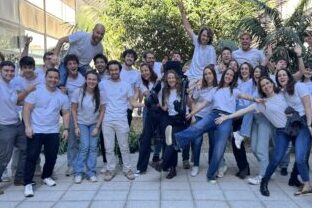17th January 2020
Recognising the physical and mental health challenges women often face after giving birth, the Women’s Health After Motherhood (WHAM) course is providing women, their partners, and healthcare professionals with evidence-based, trustworthy information on postpartum maternal health.
Supported by EIT Health and developed by the MAMMI Study, maternal health experts and women, WHAM has already helped thousands of women improve their understanding of maternal health issues since its launch in October 2019.
The free Massive Open Online Course (MOOC) spans four weeks, addressing a range of postpartum topics such as mental, physical and sexual health.
Following its success, WHAM is re-running from 20 January and is available in English, Spanish and now also in Dutch.
Created with and for women, Dr Déirdre Daly, WHAM Project Manager and Assistant Professor in Midwifery at Trinity College Dublin, tells us how the course is helping new mothers across Europe.
- Addressing the gaps in knowledge surrounding women’s postpartum health
Women who took part in the MAMMI Study, a longitudinal study exploring the health and health issues of first-time mothers in Ireland, told us that after giving birth, postpartum healthcare and information becomes primarily focussed on the baby. They also told us that they struggled to identify reliable and trustworthy sources of information about their own health. This course seeks to bridge this gap in maternal postpartum knowledge, so that women can identify what is and isn’t ‘normal’ recovery.
- Breaking the silence around maternal health issues
Maternal postpartum health issues are often underreported and undertreated. Findings from the MAMMI Study revealed that while several women experienced a range of postpartum health issues, many did not seek professional help, sometimes due to fear or embarrassment. Our aim is to help break the stigma and silence around maternal postpartum issues and encourage women to speak up for themselves and their health.
- Providing useful tool and strategies from maternal health professionals
In each week of the course, users are provided with practical tips and strategies from maternal health experts that women can use to take back control of, or maintain, their health. By using the course, women will learn to self-assess their state of health, identify whether they have experienced any of the health issues discussed, and know when and how to seek professional help, if needed.

Dr Daly and the MAMMI study team want to support women by equipping them with the tools and resources to better understand their experiences with postpartum maternal health.
“We hope women will become more informed about maternal health issues and will be able to use these resources to enhance their own health and wellbeing,” said Dr Daly.
Accessing the course
The course will run on FutureLearn, an online educational platform, from the 20 January. These resources will also be available to use, share and download on the MAMMI website.
Acknowledgements:
The MAMMI Study would like to thank EIT Health for funding WHAM (Women’s Health After Motherhood); Science Foundation Ireland (SFI) for funding MESSAGES (Motherhood, Empowerment, Sustainable Self-Help: Addressing Gaps in Knowledge through Science), the resources on urinary incontinence and PFMEs; and the Health Research Board (HRB) for funding ON-TRACK (Towards Recovery After Childbirth through Knowledge), the resources on pelvic girdle pain, mental health (anxiety) and sexual health.
Sincere thanks to the women in the MAMMI study, and to other women and experts who contributed content.
- Déirdre Daly, Assistant Professor in Midwifery, Trinity College Dublin.
- Susan Hannon, PhD student (funded by Trinity College Dublin’s Provost Scholarship Award 2019-2023), Trinity College Dublin.
- Kathleen Hannon, Research Assistant with the MAMMI study research team, Trinity College Dublin.
- Patrick Moran, Senior Research Fellow, Trinity College Dublin.
- Sarah Bowman, Director of Strategic Engagement & Impact, Office of the Dean of Research, Trinity College Dublin.
- Cinny Cusack, Physiotherapy Manager, Rotunda Hospital, Dublin.
EIT Health and the EDIT-B consortium transform bipolar disorder diagnosis with groundbreaking blood test

Discover this life-changing project today.
Three EIT Health innovators nominated for EIT Awards

Meet our three EIT Award nominees.
Hospital Clínic study reinforces patient participation as key to digital health innovation

New work published in Journal of Medical Internet Research.